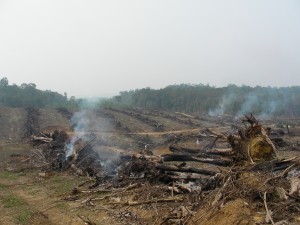 Wow. You know your brand is in the gutter when even Rupert Murdoch won’t buy from you because of your company’s bad reputation. But few companies have done as much to earn their bad name as Asia Pulp and Paper (APP).
Wow. You know your brand is in the gutter when even Rupert Murdoch won’t buy from you because of your company’s bad reputation. But few companies have done as much to earn their bad name as Asia Pulp and Paper (APP).
Responding to RAN’s campaign, Murdoch’s HarperCollins has just announced they will no longer buy paper connected to rainforest destruction, which means they will not be buying from the likes of APP.
This would be major news on its own, but on the heels of Disney’s historic policy announcement to stop using rainforest-destroying paper last October, HarperCollins’ new public commitment signifies a seismic, sector-wide shift in an industry that was recently rife with controversial paper.
Just over two years ago, independent fiber tests commissioned by RAN revealed paper linked to Indonesian rainforest destruction in books sold by nearly all top American publishers. Today, all top ten US publishers in the country recognize that customers will not accept books with paper that is connected to deforestation and human rights abuses.
This sends an unmistakable message to forest-destroying, community-displacing paper companies like APP and APRIL that consumers are demanding they clean up their acts. Please use your voice to amplify this message by contacting APP right now to tell the company to quit logging precious rainforests to make paper.
Rainforest Action Network first alerted the US publishing industry to problems in its paper supply chains in May of 2010 with a report titled “Turning the Page on Rainforest Destruction: Children’s books and the future of Indonesia’s rainforests”. Over the following year, eight of the top ten publishers in the country, including Hachette Book Group, Pearson, and Simon & Schuster, agreed to adopt commitments to stop buying paper connected to the loss of Indonesian rainforests.
Indonesia is home to some of the most biologically diverse forests in the world, but it also has one of the world’s highest rates of deforestation. APP and its main competitor, APRIL, produce over 80 percent of Indonesia’s pulp and paper and are the main source of controversial pulp found globally. Both companies have caused widespread deforestation and displacement of forest communities from their land. The habitat destruction they cause is a leading threat to the survival of the Sumatran tiger, of which only a few hundred remain
So, congratulations! We could not have achieved this milestone without you. And please, help us pile on the pressure by sending an email directly to APP today.